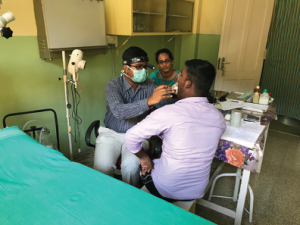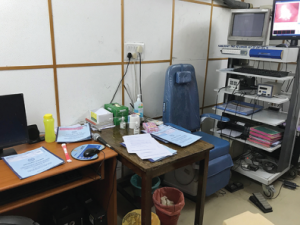Editor’s note: This article is part one of a two-part series on Dr. Yalamanchali’s medical service trip to India. Part two, which will publish in ENTtoday’s June issue, and will focus on her work with mobile hearing tests.
Explore This Issue
May 2018At the University of Kansas (KU) Medical Center in Kansas City, a partnership with a premier academic institution in India was developed through the dedication of Mani M. Mani, MD, a professor emeritus in the KU Department of Plastic Surgery. Over the years, he has opened the avenue for international educational experiences and collaborations with his alma mater Christian Medical College (CMC), located in the city of Vellore in a rural area of South India.
Founded in the early 1900s by American medical missionary Ida Scudder, MD, CMC has been ranked for decades as one of the top institutions for healthcare in India. Over the course of a day, the CMC main campus sees more than 8,000 outpatients while caring for approximately 2,133 inpatients. Patients travel thousands of miles from all over India and neighboring countries to seek care at CMC. Often, families spend days, even weeks, in Vellore receiving comprehensive care, treatment, and follow-up for multiple family members at once.
Most patients do not have health insurance and must save money for months, and even years, to be able to afford their care. CMC also has multiple local urban and rural outreach sites with limited capabilities. These outreach sites cater to local villagers who often cannot travel to the main hospital for care and have to rely on local resources and incoming providers for their care.
The University of Kansas Department of Otolaryngology–Head and Neck Surgery built upon this existing relationship by creating a four-week resident research block to foster a collaborative research endeavor with the CMC Department of Otolaryngology. For the four-week experience, I traveled to Vellore with the goal of conducting hearing evaluations using mobile technology while seeking to validate the methodology for the CMC population.
As a current resident in training, my global health experience was a reminder of the true humanitarian focus of our field and our capacity to create change —Sreeya Yalamanchali, MD
A Vastly Different Medical System

Dr. Yalamanchali and laryngology fellow Dr. Kavin Kumar during outpatient clinic at St. Thomas Hospital.
© Dr. Yalamanchali
A majority of my family still lives in India and, over the years, I have spent countless summer and winter vacations in India. The opportunity to combine my heritage and my career motivated me to pursue a global health research project. Yet, no previous visit actually prepared me for the Indian healthcare system, as it is so vastly different from the United States system. Each day at CMC, hundreds of people wait patiently in the otolaryngology clinic spaces for hours to receive their care.
Space, time, and resources are so limited that, for example, a single room is reserved for flexible laryngoscopies and postoperative sinus debridements to facilitate the clinic flow and accommodate a high volume of patients. I learned valuable lessons in resource utilization and improvisation while shadowing attendings at CMC who are adept at providing effective healthcare services despite numerous constraints.
Hearing loss is a global problem affecting millions of people around the world. Often, the otolaryngologists at CMC travel hours to remote village clinics multiple times a week to provide basic otolaryngology care to local villagers who otherwise would have no access to healthcare. Audiology services in these clinics are scarce, even though hearing loss and chronic ear disease are quite prevalent. To improve access to hearing healthcare, a portable tablet audiometer for use outside a sound-treated booth was developed by SHOEBOX Audiometry (a division of Clearwater Clinical, based in Ottawa, Ontario, Canada).
Rural India lacks necessary healthcare resources, and most physicians in India are concentrated in the bigger cities, leading to significant disparities in many regions. I was able to take this innovative piece of mobile technology and work with the CMC department to implement the first steps in improving accessibility to hearing healthcare in rural India.
Otolaryngologists as Global Health Humanitarians

Dr. Yalamanchali’s clinic room for conducting audiograms using portable audiometry.
© Dr. Yalamanchali
As a current resident in training, my global health experience was a reminder of the true humanitarian focus of our field and our capacity to create change. By gaining exposure to a healthcare system very different from that in the U.S., we have started a critical dialogue to improve healthcare delivery, both abroad and locally.
As the world and its economies become increasingly globalized, it is necessary to think about healthcare in a global context. In many parts of the world, limited resources lead to unequal distribution of healthcare. Otolaryngology is a technologically advanced field, and the things we take for granted in the U.S. are often luxuries in resource-limited regions. In the U.S., we routinely use otoscopes, microscopes, endoscopes, and advanced surgical instruments that are rare in most parts of the world.
Otolaryngologists have long been involved in global humanitarian surgical and clinical care efforts. Quite often, global health initiatives consist of short-term medical service trips. These much-needed short-term reliefs often fall short of identifying and solving long-term problems. To better define and cultivate the field of academic global health, there has been a call to include formal coursework and a push to foster sustainable collaborations with teaching hospitals overseas (Surgery. 2013;153:316–320). There has even been a significant increase in the volume of global health-related publications in otolaryngology journals with growing awareness and interest in global health as an academic pursuit (Laryngoscope. 2015;125:848–851).
While there is no single commonly accepted definition of global health, the Committee on the U.S. Commitment to Global Health offers the following definition: “health problems, issues, and concerns that transcend national boundaries, and may best be addressed by cooperative actions […] and the goal of improving health for all people by reducing avoidable disease, disabilities, and deaths.” By partnering with CMC, we hope to work in union and learn from each other’s strengths while overcoming healthcare barriers in every setting together.
Sreeya Yalamanchali, MD, is a fourth-year resident in the University of Kansas Department of Otolaryngology–Head and Neck Surgery. Read more about Dr. Yalamanchali’s medical service trip to Vellore, India on the KU ENT Global Health blog.